Machine Learning in Marketing Practice
Published: Oct 7th 2020 | 8 min read

While businesses are beginning to fully realize the potential of Machine Learning (ML), building ML models requires advanced data science skills and is a very tedious and time-consuming process. Automated ML focuses on improving the productivity of data scientists by recommending good ML models in a very short period of time and enabling data analysts, BI professionals, developers, and domain experts to build ML models without understanding the complexity of feature engineering, algorithm selection, and hyperparameter tuning. During a three-hour-long session, we highlighted several Machine Learning technologies and automated capabilities, to help understand the value it provides.
At the very beginning, we overviewed interesting and innovative technologies and applications of AI, mostly on the theoretical level, and gave a good introduction to the following practical presentations given by our Marketing Data Science experts.
Part 1 | Azure Machine Learning
The first practical part of the workshop focused on Azure Machine Learning (AML). A short tool overview was followed by a business case of how to use ML to effectively motivate customers with discounts taking into consideration that some customers do not need to be given discounts, which in the end can bring significant savings.
Introducing Azure Machine Learning
Azure Machine Learning is a tool developed by Microsoft providing a comprehensive solution for managing the whole process of creating machine learning models. This tool provides an option to create ML models for various professional levels:
- Notebooks for data scientists who love coding in Python/R
- Designer for analysts with knowledge of modeling process
- Automated ML option is useful especially for marketers and managers
It is possible to create models based on “standard” structured tabular data and also custom algorithms for text analytics and object recognition based on textual files or pictures. AML supports deployment of the models as a web service which is easily approachable via simple REST API or as a batch service for batch modeling within databases. Powerful computing ensures quick response, stability, and high accessibility.
AML covers the whole process of creating ML models:
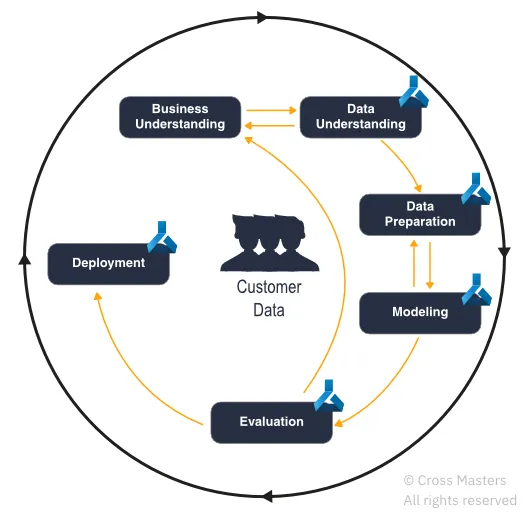
Business Case - Optimizing discount popup
One of our clients has an e-shop with apparel. They decided to run a campaign to motivate visitors to make a purchase on their website by offering them a 10% discount via a popup message when visiting the e-shop.
The current solution was not effective as it did not differentiate between various types of intents visitors could have and treated them equally. This led to a loss of interest resulting in loss of money!
More efficient solution with Machine Learning
Before:
-
Visitor A visited the website to see some inspiration and check offers. They were not interested in purchasing anything at that moment and they actually did not buy anything in the end (red cross). It would be more suitable to engage them via some inspirational content.
-
Visitor B visited the web page after some investigation of its offer on product comparators, however, they were still hesitating. The discount stimulated them to purchase the shoes they always wanted.
-
Visitor C visited the website with a clear intent to buy a specific product, they would buy regardless of the discount. In the end, they bought the product with a 10% discount. This is an additional cost for the e-shop.
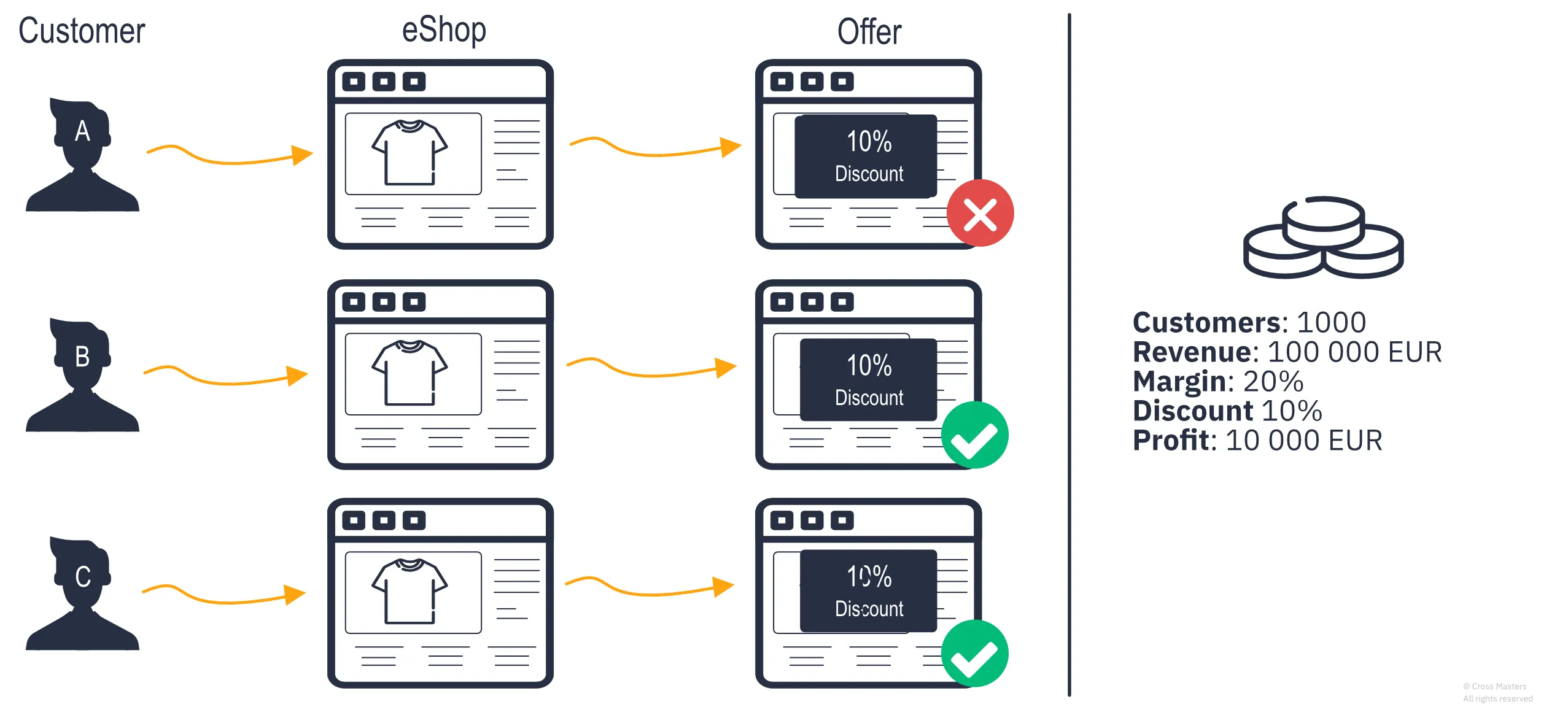
The goal of the ML model is to make the popup content more efficient by predicting customers’ intent. To do so, visitors are divided into four groups based on the decision process funnel and the probability of their intent.
Each group receives personalized content in the popup. This solution can save money by not offering a discount to those visitors who would purchase the product anyway and moreover it moves down through the funnel all visitors that are in earlier stages of the decision process.
Visitors recognized as in the “Attention” stage with conversion probability below 25% are provided with inspirational content, increasing their engagement and moving them towards the “Interest” stage
Visitors recognized as in the “Interest” or “Desire” stage with conversion probability between 25% and 75% are offered a newsletter subscription which will tell them more about specific products and increase their motivation to move to the final “Action” stage.
Visitors recognized as in the “Action” stage with conversion probability between 75% and 90% are provided with a 10% discount voucher to motivate them to finish the conversion process.
Visitors recognized as in the “Action” stage with a conversion probability of over 90% are not provided with any offer, the model expects they would convert anyway, and no additional stimulation is needed.
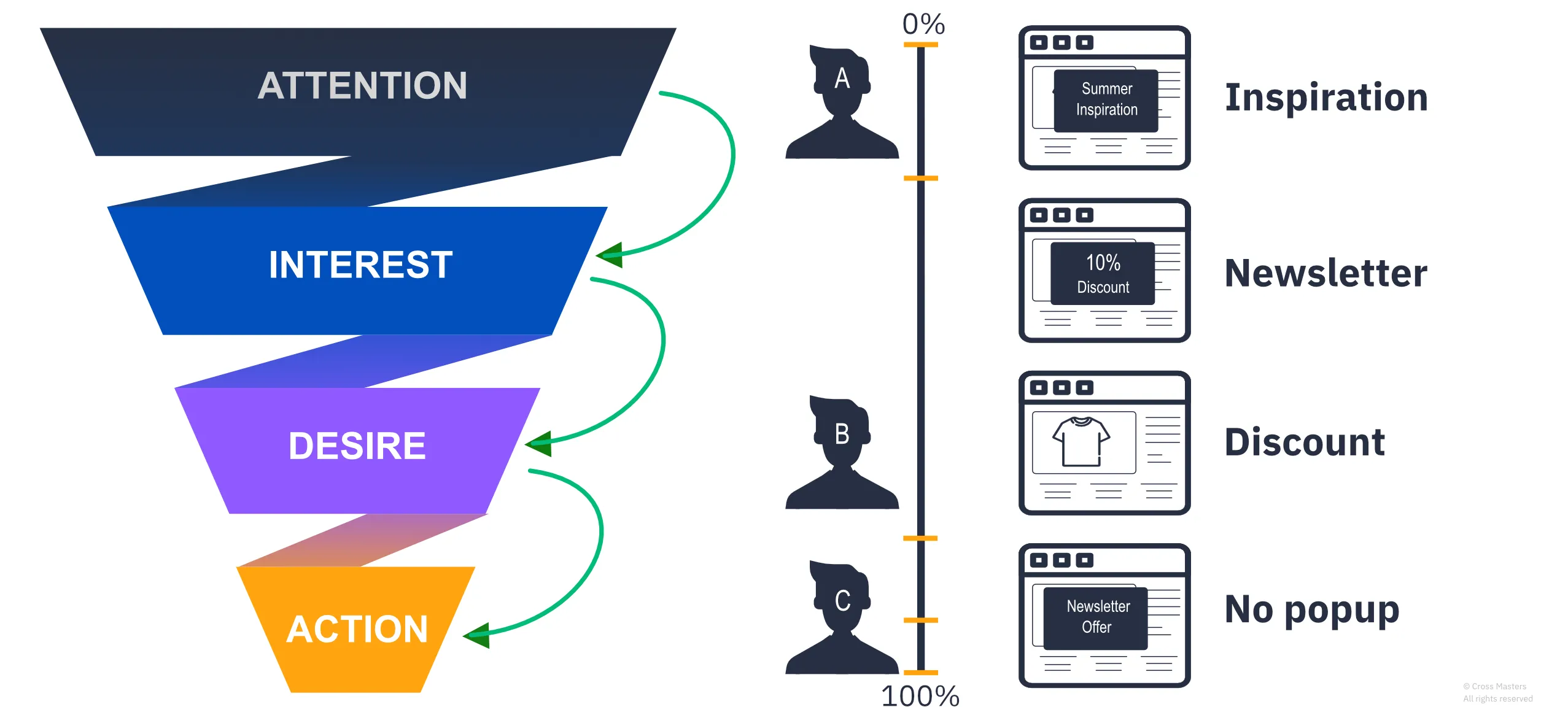
This particular model was trained on exemplary data of customers and their behavior on the web (from what channel they approach the website, what was the landing page, if they ever purchased something etc.).
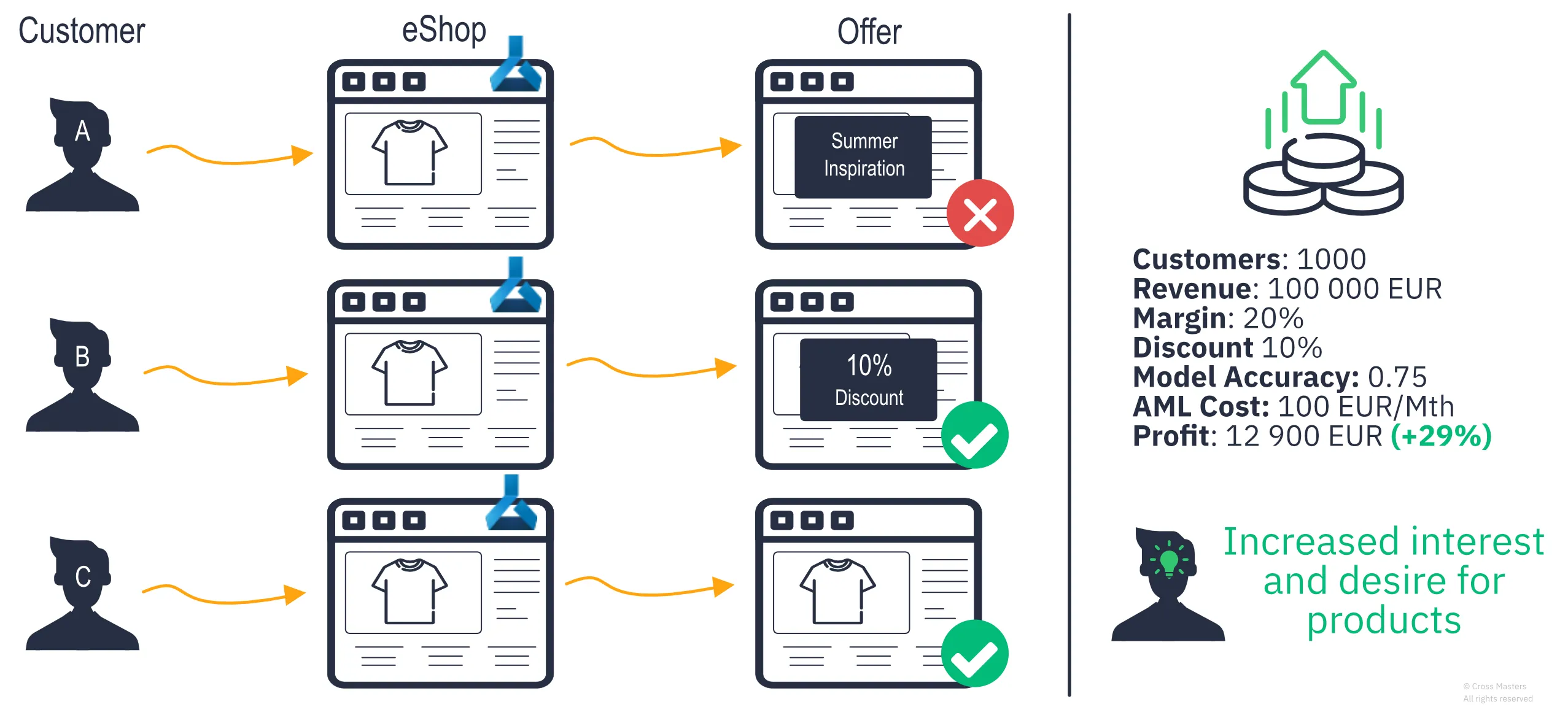
After the deployment of the model, each user is provided with suited content leading to a 30% profit increase and an escalated number of visitors moving through the decision process towards the action.
Part 2 | Azure Databricks
The second practical part of the workshop concentrated on Azure Databricks. As an introduction, we went over the tool overview and continued with two business cases: effective product recommendation and optimizing smart bidding.
Introducing Azure Databricks
Azure Databricks is an Azure service providing a very broad spectrum of possible uses. Serving people from many data-utilizing areas, it can process data from a wide range of sources and can output results into many other services. Incorporating the Apache Spark for data processing, Azure Databricks is constructed for simple and optimized use of big data.
Another main advantage of Databricks is allowing cooperation even at the same time and within the same notebook which is further enhanced by the support of multiple programming languages (Python, Scala, R, SQL, Java). The security is ensured by role-based access and integration of Azure Key Vault service for safe work with sensitive information. The usefulness of Azure Databricks is illustrated in two selected cases below.

Business Case - Product ranking
Due to a generally high number of product pages, e-shops need to sort their products to ensure that customers do not need to search through many pages before finding the most favorite pieces. There are several ways to approach sorting which can be selected based on the company's needs and data availability.
- Sorting based on a single metric, like impressions and conversions would lead to fixing the same products on the top of the list and thus driving away bored customers. Therefore, when sorting based on product parameters, it is important to include other metrics, like past trends and profit margin to respond to trends and to optimize based on profit.
- Alternatively, sorting can be personalized based on either related products to those a customer has already viewed or related customers by offering products they have shown interest in. Personalization may provide more tailored recommendations but requires significantly more data and more time and space for computation. By incorporating Azure Databricks into your solution you have the benefit of optimized big data processing along with the possibility to process data in real-time.
To evaluate the selected sorting of products, the A/B test allows you to compare two groups of randomly divided customers which helps you to avoid interpreting the evaluation without mistaking the effect of improved sorting with unrelated external influence. If the first version of product ranking is successful (as is visible on the result from the A/B test below), the continual improvement and subsequent testing can proceed.

Business Case - Improving Google Ads Smart Bidding Algorithm
The smart Bidding Algorithm for Google Ads is optimizing advertisement strategy by investing in ads that bring more profit. For this optimization, the algorithm needs to have correct and timely information about the profits from orders. However, this is often a problem e.g. due to returned orders or due to buying the products to store only after a customer has paid for them. For this reason, the Smart Bidding Algorithm calculates with revenues, assuming the simple constant margin and constant return rate for all products. This can be improved by predicting the profits - either using a complex model for the profit or separating profit into a multiplication of revenue, margin, and return rate where revenue is known, average margin can be taken from the database, and return rate can be predicted using a binary model.
Azure Databricks helps you combine the necessary data both from real-time streams and a regularly updated database. Predicted profits are loaded into Google Ads so that Smart Bidding Algorithm can improve the advertising in the browser and bring more customers and more future profit.
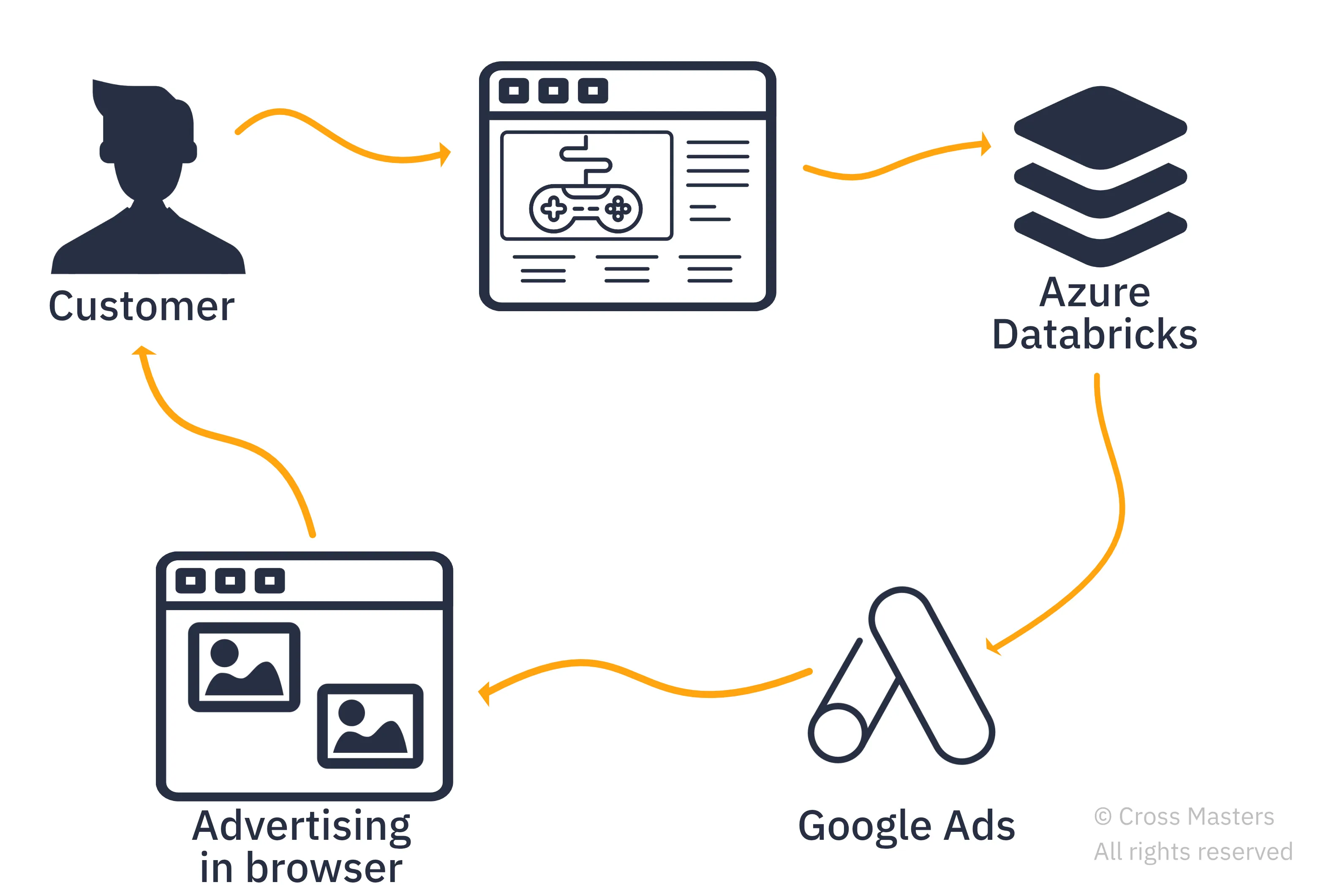
Summary
In summary, we showcased three practical uses of Machine Learning in e-Commerce, yet the number of ML applications is far bigger. With an increasing number of different tools providing automated algorithms it is always good to know what your data is flowing through before deciding on a specific option. With Azure, you can not only ensure security, but also it can be very easily connected to cloud storage and other tools that overall create one well-working and inter-connected environment, built for your convenience and, more importantly, increasing customer engagement and returns.
We have applied similar and many more solutions. Marketing combined with Data Science experience and technical expertise provides us with a competitive advantage to build custom solutions for each project.

